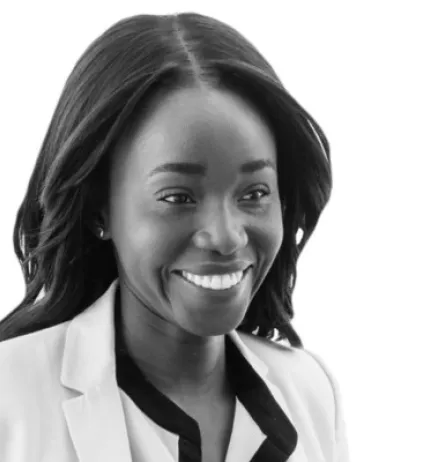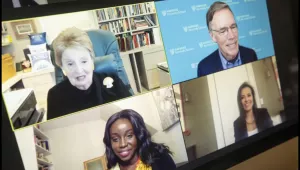
Senior Fellow with the Defense, Emerging Technology, and Strategy Program.
Former Assistant Director for Space Policy, White House Office of Science and Technology Policy (OSTP).
In 20 years of U.S. government service with a final tour at the White House, Dr. Uzo-Okoro’s career includes contributions to national policy and over 60 NASA missions and programs. Her experience creating complex spacecraft, guided by values of efficiency, sustainability, and global collaboration, resulted in strategies for U.S. technological leadership and future economic growth.
Dr. Uzo-Okoro drove innovation in space, aeronautics, and advanced manufacturing at the White House Office of Science and Technology Policy. She developed national policy to facilitate the multibillion-dollar space economy. Her policy work included action plans in the areas of monitoring our climate and Earth through satellite observations, ensuring Space Sustainability through national and G7 action on Orbital Debris, and securing U.S. preeminence in Low Earth Orbit. She also worked to prepare our critical infrastructure for the impacts of Space Weather, and outlined national priorities for the aviation industry. She created supply chain tools to accelerate resilient solutions in several manufacturing sectors to benefit global businesses, end-consumers, and society. She also worked to grow the space asset class. She expanded the existing field of on-orbit space services and ushered in a strategic vision and action plan for the United States to lead in universal innovative capabilities, such as, robotic assembly and refueling satellites in space. She is the originator of the terms “In-space Servicing, Assembly, and Manufacturing” and “ISAM”.
She convened the U.S. government on civil, private, and national security aerospace, aeronautics, and advanced manufacturing, to improve the use of private sector services and increase efficiencies and sustainability in government activities on Earth and in space. She also highlighted astrophysicists on the James Webb Space Telescope historic first image through a reveal by President Biden. Globally, her work on orbital debris, space technologies, and space weather policies have served as a blueprint for space agencies in Europe, Australia, and New Zealand. She devised the first-ever Space Forum at the U.S.-Africa Leaders Summit and facilitated the first African nations – Rwanda and Nigeria – to join the U.S.-led set of space sustainability principles.
In 17 years at NASA, she contributed to over 60 missions and programs – as an engineer, technical expert, manager, and executive – in earth observations, planetary science, heliophysics, astrophysics, human exploration, and space communications, which represent $9.2B in total program value.
At NASA Headquarters, she led a heliophysics portfolio of spaceflight missions as a program executive.
At NASA Ames Research Center, she directed the Small Spacecraft Mission Design Division, including the Mission Design Center, led teams in developing advanced spacecraft mission concepts, and developed partnerships with government agencies. In several Chief Engineer roles, she provided oversight for over 20 programs on systems engineering and software systems as the technical authority. She led a mission design concept for a constellation of eight small satellites for the HelioSwarm mission.
At NASA Goddard Space Flight Center, she contributed engineering leadership and technical development of flight hardware and software on several spacecraft missions, including TESS (launched 2018), NICER (launched 2017), GPM (launched 2014), Constellation Program - Orion/EFT-1 (launched 2014), ELC (launched 2009), and Cassini (Saturn's Orbit Insertion in 2004). She also co-led the $300M Spacecraft Communication and Navigation Integration Project with the Jet Propulsion Laboratory and NASA Glenn Research Center partners. She served as the technical authority on over 20 operational missions. Within research and development, she led the development of remote-sensing image registration algorithms, which resulted in NASA-owned registration algorithm patents.
She earned an undergraduate degree in Computer Science from Rensselaer Polytechnic Institute, and masters degrees in Aerospace Systems, Space Robotics, and Science & Technology Policy from Johns Hopkins University, MIT, and Harvard University, respectively. She also earned a doctorate degree in Aeronautics and Astronautics from MIT. She received several NASA awards and the 2023 Commercial Space Federation Commercial Space Policy award. As a co-inventor, Uzo-Okoro shares one space robotics-related patent.
She founded Terraformers.com a regenerative agriculture startup focused on low-cost food solutions to grow food through productive and networked backyard garden platforms in Silicon Valley and Nigeria, as a precursor to growing food in space. She advises multiple tech start-ups.
She is a term member of the Council on Foreign Relations. She was a 2018 Presidential Leadership Scholar, a program led by Presidents Bush and Clinton. Her story is profiled in President George W. Bush’s book, 'Out of Many, One'.
She is a retired marathon runner, and still enjoys permaculture gardening.



